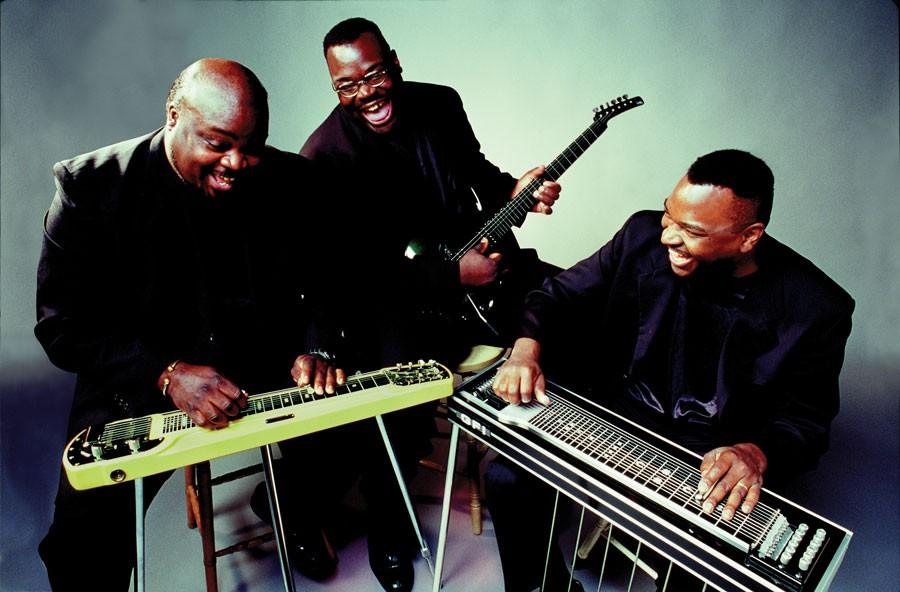The Campbell Brothers bring sacred steel to Dibden stage
A lively crowd poured into Dibden Center for the Arts on Wednesday evening, Feb. 3, for an inspired celebration of gospel and blues music, courtesy of sacred steel ensemble, The Campbell Brothers.
Far from feeling antiquated, The Campbell Brothers’ brand of sacred steel is a rich slice of African-American gospel music and heritage. This style of music is characterized by the use of steel guitars, wrapping around its soulful instrumentation, which peaks and valleys. The genre was founded in the 1930s as a staple in Pentecostal churches.
The Campbell Brothers spare few seconds in transforming the Dibden stage into a grooving family affair. They open their performance on a blissful note with two original songs “Don’t Let Nobody Turn You Around” and “I Ain’t Gonna Cry No More.” As a growing number of the shows’ attendees begin spilling into their spirited dances, pedal steel guitarist Chuck Campbell bent note after note, leaving his audience swaying along, moved by the sounds created by his technique.
Campbell is joined on stage by his two brothers, Darick Campbell on his lap-steel guitar, and Phillip Campbell on his electric guitar. Drummer Carlton Campbell, Phillip’s son, and bassist Daric Bennett held down the rhythm section in perpetual lockstep with one another. Meanwhile, the powerful vocals of Denise Brown accentuated the evening’s most excitable moments.
The band later ventures into a rousing instrumental rendition of Sam Cooke’s 1964 soul classic, “A Change is Gonna Come.” This poignant moment upholds Cooke’s message of hope for racial justice and equality, while managing to feel nuanced and strikingly authentic. The two steel guitarists share sizzling and swirling leads throughout the song, while Campbell remains artfully subdued behind the kit until called upon to build the songs’ swelling instrumentation with power, technical skill, and grace.
Electric guitarist Phillip Campbell, like his bandmates, commands his instrument expressively, while providing much of the commentary in between songs. Throughout the evening, Campbell routinely energizes his audience by standing up from his chair, ripping into a solo, and inspiring his crowd as they gape fixedly on the exuberant performers in awe.
Darick Campbell dazzles the audience with his pedal steel guitar by imitating the strained call of an oncoming locomotive on the foot-stomping number “Morning Train.” Soon after, The Campbell Brothers get soulful again with a stirring version of “Amazing Grace,” whipping the audience into a joyous trance as Campbell’s pedal steel churns out each weeping note to his satisfaction, while Denise Brown adds her soaring vocals to the gospel staple.
The rich textures of Phillip Campbell’s rhythmic precision and the sound mechanics of his son behind the kit blend beautifully with the innovative playing of the two steel guitarists on “Don’t Let the Devil Ride,” filling the theatre with positive vibes.
At this point in the show, dancing students are joined by faculty members as an enlightened gathering of young and old occupies the space between the stage and the first row of seats. It is now evident that there are no age limits to experiencing a good time.
Dibden Center for the Arts has now been transformed into a spirited union, regardless of religious affiliation. As The Campbell Brothers launch into one of the night’s most animated performances with their song “Hell No! Heaven Yes!” hands are raised per instruction of the leading vocalist, Brown, who is later echoed by the backing vocals of the three Campbell siblings.
This lively affair is concluded with electric guitarist Campbell’s instruction to “clap your hands and stomp your feet! We call this piece of music ‘Jump for Joy!’” The song showcases the skilled musicianship of each member on stage, beginning with the sporadic wah-wah effects of the pedal and lap steel players. Both execute a range of solos in such seamless transitions that it was difficult to know when one measure ended and another began.
Suddenly, the guitars cease playing and Carlton Campbell busts into a thundering drum solo before giving way to Bennett, their bassist, for a rare bass solo. Bennett plucks and rumbles his electric bass, adding in a layer of funk and grooving rock.
Collectively, The Campbell Brothers brought their message of love and joy into a refreshing live performance of sacred steel, gospel, and blues music before a receptive audience. For an art form that was established in the early 20th century, this sacred steel movement feels eternally youthful and rich in African-American culture.






